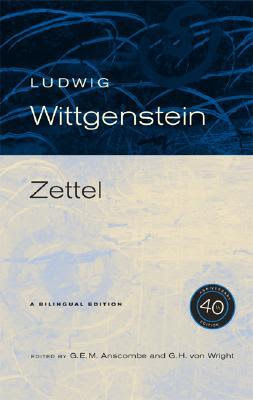
ISBN: 978-0-520-25244-8"Zettel" by Ludwig Wittgenstein is a collection of short writings that were put in a filing cabinet by the author, and later collected by G.E.M. Anscombe and G.H. von Wright. Wittgenstein is probably the most difficult, but yet, enjoyable read for me. As a writer, I often think of him as a role model of sorts. The way he looks at the world is unique, and his thinking of what an image is and what is the thought of that image has a profound effect on me. And again, I may have misread him, and made my own version of Wittgenstein!
I usually re-read his pocket size statements or observations twice. But in the long run, I think it's good to read him straight through, and not worry about getting 'it' on the first try. He's a philosopher where it's best to meditate on his words and the meaning of his sentences through your own dear time. "The limitlessness of the visual field is clearest when we are seeing nothing in complete darkness." That statement stays in my mind the most because I find myself writing in a state of mind that is very much a dark void. I then fill that space with words, that is usually connected to something visual or a sensuality of an object of some sort.
Wittgenstein didn't write a lot. Some of his 'literature' is from his lectures in class. I'm presuming that this book is him working through his philosophy/thoughts. Which is another reason why I love Wittgenstein's work so much is that it's not about the answer, but the journey. He focuses on the senses, and how that communicate to our brain. His writing is not scientific, but almost poetry. In fact, I tend to look at him as a poet than anything else.
- Tosh Berman
Published on April 29, 2017 12:35

"And Wittgenstein, as well, I read in some biography loved to watch cowboy movies; he would go every afternoon to watch gunfights and arrows through the chest for hours at a time. Can you take seriously a person's theory of language when you know that he was delighted by the woodenness and tedium of cowboy movies. Once in a while, fine - but every day? Yet while these tiny truths about three philosophers (of whom, to be honest, I have read very little) have at least disabled any intereset I might have had in reading them further, I crave this kind of detail.